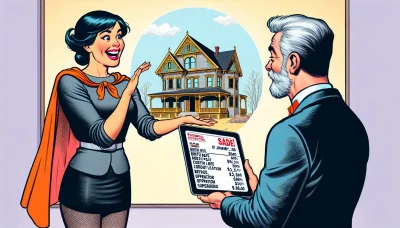2nd home Quiz
Test Your Knowledge
Question of
Choosing the Right Second Home
Location Considerations
The location of your second home is pivotal. You want a place that serves as a retreat yet is accessible. Consider how far you're willing to travel, and if the journey is part of the escape or a barrier to relaxation.
Analyze the local vacation and rental markets if you're eyeing potential income. A desirable location ensures higher rental demand and better appreciation. Research historical market trends, talk to local experts, and visit during different seasons.
Proximity to Primary Residence
Proximity can greatly influence convenience and usage frequency of your second home. Homes closer to your primary residence allow for spontaneous weekend getaways or easy maintenance trips without the hassle of long-distance travel.
Vacation and Rental Market Analysis
Understanding the area's seasonal fluctuations helps predict rental income potential. Look into factors like peak tourist seasons, local attractions, and future developments that could affect property values and desirability.
Type of Property
The type of second home you choose should align with your lifestyle needs and investment goals. Single-family homes offer privacy and space but may come with higher maintenance costs compared to condos which offer convenience at the expense of HOA fees.
Single-Family Homes vs. Condos
Single-family homes typically provide more control over the property but require more upkeep. Condos, while potentially less private, offer amenities and services that can be attractive both for personal use and rental appeal.
Investment Potential of Different Property Types
- Single-Family Homes: Often appreciate faster due to land ownership but come with greater responsibility for maintenance.
- Condos: Can be easier to manage, especially in popular tourist destinations with professional management options available.
- Vacation Villas: Offer luxury experiences that may command higher rental rates but also entail premium maintenance costs.
- Townhouses: Provide a balance between single-family homes and condos, usually featuring community amenities with some level of private space.
Financing Your Second Home
Mortgage options for second homes differ from primary residences; they often require higher down payments and have stricter approval requirements. Shop around for lenders who specialize in second home financing to secure terms that align with your financial strategy.
Mortgage Options for Second Homes
Become familiar with different mortgage products available for second homes. Interest rates might be slightly higher than primary homes, so calculate these costs into your budgeting plan.
Understanding Tax Implications
Tax implications for owning a second home can vary based on how you use it. If it's rented out for part of the year, there are specific IRS rules on rental income. Consult a tax professional to navigate these waters effectively.
Managing Second Home Expenses
Budgeting for Additional Costs
When it comes to owning a second home, budgeting goes beyond the mortgage. You need to account for property taxes, insurance, and HOA fees, which can fluctuate and often increase. It's essential to create a financial buffer for these additional costs to avoid any unpleasant surprises.
Setting aside funds for unexpected repairs is also crucial. Since you're not always present, small issues can escalate quickly into costly emergencies. Regularly saving a portion of your rental income, if applicable, can build a solid maintenance fund.
Maintenance and Upkeep Expenses
Consistent maintenance is key to preserving your second home's value. This includes seasonal services such as landscaping in the summer or snow removal in the winter, as well as routine checks on appliances and systems to prevent breakdowns.
Enlisting local professionals for regular inspections can save you money long-term. They'll catch problems early and keep your property in top condition, ensuring it's always guest-ready or a pleasure for your own visits.
Utility Management for Seasonal Use
If your second home isnt used year-round, smart utility management is vital. Installing programmable thermostats can help manage heating and cooling costs remotely. This way, you only pay for what you need when you need it.
Consider suspending services that aren't necessary during off-seasons, like cable or landscaping. Many providers offer vacation holds that can significantly reduce annual expenses without the hassle of reinstallation each season.
Insurance for Second Homes
Insurance for a second home often comes with higher premiums due to the increased risks associated with part-time occupancy. Its important to shop around and find an insurer that understands the unique needs of second homeowners.
Make sure you're aware of what your policy covers. Standard policies might not protect against specific threats like flooding or earthquakes, which could be crucial depending on your home's location.
Coverage Types for Different Properties
Different types of properties require different insurance coverages. For instance, a beachfront condo might need additional hurricane coverage, while a mountain cabin could require extra protection against snow or wildfire damage.
Consult with an insurance agent who specializes in secondary properties to ensure you get comprehensive coverage tailored to your property type and location.
Dealing with High-Risk Locations
- Evaluate Risk: Understand the natural disasters prevalent in the area and how they impact insurance costs.
- Flood Insurance: Consider separate flood insurance if your home is in a flood-prone zone; standard policies typically exclude flood damage.
- Safety Measures: Implement protective measures such as storm shutters or reinforced roofing to possibly lower premiums.
- Regular Reviews: Regularly review and update your policy to ensure adequate coverage as conditions and regulations change.
- Deductibles: Opting for higher deductibles can lower premiums but ensure they are still affordable in case of a claim.
- Loyalty Discounts: Check if bundling multiple policies with one insurer offers discounts without compromising on coverage quality.
Saving on Second Home Costs
Tax deductions are a significant area where second homeowners can save money. Mortgage interest, property taxes, and sometimes even rental expenses may be deductible. Always consult with a tax professional about current laws affecting second-home owners.
Renting out your property when not in use can provide additional income which helps offset costs. Make sure to understand local regulations and tax implications related to short-term rentals before diving in.
Tax Deductions and Credits
Taking advantage of tax deductions related to loan interest or certain improvements can reduce overall expenses. Keep meticulous records of all expenditures as they might qualify for deductions come tax time.
In some areas, credits may be available for preserving historic homes or converting properties into rental units. These incentives can significantly defray renovation costs while contributing positively to the community.
Energy Efficiency and Green Upgrades
Making energy-efficient upgrades not only saves on utility bills but may also qualify for tax credits or rebates. Solar panels, energy-efficient windows, and insulation are just some upgrades that can lead to long-term savings.
Audit your second home's energy usage to identify potential improvements. Many utility companies offer free or discounted energy audits that provide insights into how you can reduce consumption and save money.
Second Home as an Investment
Investing in a second home can be a thrilling venture with potential for significant financial rewards. Not only do you get to enjoy a vacation spot, but this asset can also generate substantial income and contribute to long-term wealth. With the right strategies, a second home investment could be a game-changer for your financial portfolio.
The allure of owning a second home goes beyond just having a getaway destinationit's about making smart financial moves. By turning your property into an income-producing asset, you're setting the stage for both immediate cash flow and future capital gains. Let's dive into what makes a second home a compelling investment opportunity!
Rental Income Opportunities
Rental income is the heart of the investment potential in second homes. Whether you're considering short-term vacation rentals or long-term leases, your second home can become a consistent source of revenue. By tapping into the lucrative rental market, you're unlocking an incredible opportunity to elevate your earnings.
To truly capitalize on this investment, it's essential to understand local demand and optimize accordingly. This means furnishing your property to attract tenants and marketing it effectively to maintain high occupancy rates. Master these elements, and watch as your second home transforms into a rental income powerhouse!
Short-Term vs. Long-Term Rentals
When it comes to rentals, there's a dynamic duel between short-term and long-term options. Short-term rentals offer flexibility and potentially higher rates, while long-term leases promise stability and less frequent tenant turnover. Your decision here will shape your investment strategy and impact your bottom line.
It's crucial to consider factors like location, seasonality, and local regulations when choosing between short-term or long-term rentals. Each has its unique set of challenges and rewards, dictating the rhythm of your investment journey. Aligning your rental strategy with these considerations will pave the way for success.
Maximizing Occupancy Rates
To maximize occupancy rates, think like a marketerpromote your property's best features and make it irresistible to renters! High occupancy equals more income; it's that simple. But achieving this requires savvy marketing efforts and top-notch tenant relations.
Avoid the pitfalls of vacancy by employing strategies that keep your property booked year-round. This might include offering competitive pricing, exceptional guest experiences, or even off-season discounts. Remember, every night booked is money in your pocket!
- Optimize Your Listing: Use high-quality photos and compelling descriptions.
- Pricing Strategy: Set competitive rates based on market research.
- Excellent Guest Experience: Provide amenities and services that stand out.
- Seasonal Promotions: Offer deals during off-peak times to attract guests.
- Maintenance: Keep the property well-maintained to encourage repeat bookings.
Appreciation and Real Estate Market Trends
The sizzle of real estate comes from appreciationthe increase in property value over time. It's not just about rental income; appreciation can significantly boost your investment returns when it comes time to sell. Understanding market trends is key to predicting how well your second home will fare in the future.
Analyzing historical data provides insights into long-term market behaviorsvital knowledge for any investor aiming for appreciation gains. While past performance doesn't guarantee future results, it's a powerful tool in gauging potential growth prospects for your second home investment.
Historical Data Analysis
Diving into historical data is like being a detective on the trail of appreciation clues. This analysis can reveal patterns that inform smart buying decisionscrucial in choosing a second home that will likely increase in value over time. It's all about buying smart today for bigger returns tomorrow!
Harnessing historical data isn't just about looking back; it's about forecasting future possibilities. By understanding how properties have appreciated in the past, you can make informed predictions about their trajectorysetting yourself up for potentially lucrative exits from your investment.
Predicting Market Movements
Predicting market movements might seem like gazing into a crystal ball, but it's actually grounded in careful observation and analysis. It involves interpreting economic indicators, staying abreast of industry news, and even monitoring political changes that could impact the real estate landscape.
No one can predict the future with absolute certainty, but aligning yourself with market trends can position you advantageously within the real estate arena. Being proactive rather than reactive is key when navigating the waves of property value fluctuations as part of your overall investment strategy.
Diversifying Your Investment Portfolio
Diversifying with real estate adds robustness to your portfolioa shield against volatility in other markets. A balanced mix of investments is akin to not putting all your eggs in one basket; it helps mitigate risk while still providing opportunities for growth through different economic cycles.
A second home can serve as both an enjoyable retreat and a tangible asset within a diversified portfoliooffering both personal pleasure and financial fortification against market uncertainties. Its an embodiment of enjoying life while investing wisely!
Balancing Real Estate with Other Investments
Balancing real estate with other investments is like orchestrating a symphonyeach instrument plays its part in creating harmony within your portfolio. Real estate often moves differently than stocks or bonds, providing counterbalance during times of market unrest or downturns in other sectors.
A strategic mix that includes real estate alongside stocks, bonds, or other assets creates an equilibrium that can enhance returns while reducing overall risk exposureits all about crafting an investment melody that resonates with stability and growth potential!
Risks and Rewards of Real Estate Investments
The risks associated with real estate are undeniablebut so are the rewards! Like any investment endeavor, there are no guarantees; however, being educated on market dynamics helps you navigate risks effectively while positioning yourself for those sweet rewards.
The charm of real estate lies not only in its potential monetary gains but also in its tangible natureyou can see it, touch it, improve it! This blend of physical presence with financial benefits makes investing in a second home not just exciting but also immensely satisfying on multiple levels!
Legal Considerations for Second Home Owners
Understanding Zoning Laws
Zoning laws are critical for second home owners as they dictate permissible uses of the property. Whether you're envisioning a serene retreat or a bustling rental, it's crucial to understand local zoning ordinances.
Not adhering to these regulations can lead to fines, forced compliance measures, and even litigation. Always consult with a knowledgeable real estate attorney or local officials before making any significant decisions regarding your second home.
Restrictions on Rentals and Property Use
Rental restrictions are often at the forefront of zoning considerations for second homes. Some areas may have stringent limitations on short-term rentals, which could impact your ability to generate income from your property.
To avoid legal pitfalls, familiarize yourself with any homeowner association rules, rental caps, and licensing requirements. Being proactive in understanding these restrictions will save you from future headaches and financial losses.
Navigating Local Ordinances
Local ordinances can be labyrinthine, affecting everything from noise levels to building aesthetics. As a second home owner, staying informed about these rules is not just smartit's essential.
Engage with community boards or neighborhood associations. They can provide invaluable insights into the nuances of local ordinances that could influence your enjoyment and use of your second home.
Estate Planning and Inheritance Issues
Estate planning is paramount for second home owners who want to ensure their property is passed on according to their wishes. It's about safeguarding your legacy and providing clarity for the future of your real estate assets.
Without proper estate planning, your heirs could face legal battles or unintended tax consequences. Consult with an estate attorney to create a comprehensive plan that addresses all potential scenarios.
Succession Planning for Real Estate Assets
Succession planning for real estate involves more than just drafting a willit requires strategic thinking about the future management and ownership of your property.
- Establish clear ownership: Determine whether the property will be left to an individual or shared among multiple beneficiaries.
- Create a trust: A trust can help manage your property upon your passing while potentially avoiding probate court.
- Consider life insurance: Life insurance policies can provide the necessary funds for upkeep or taxes associated with the property after you're gone.
- Keep documents up-to-date: Regularly review and update your estate documents to reflect changes in relationships, asset values, or personal wishes.
- Maintain open communication: Discuss your plans with heirs to prevent confusion and conflict later on.
Tax Implications for Heirs
Inheriting a second home isn't just an assetit also comes with tax implications. Heirs may face inheritance taxes or capital gains taxes upon selling the property.
A well-structured estate plan includes strategies to minimize tax burdens for your heirs. It's not just about what you leave behind; it's about how you leave it behind that counts.
Cross-Border Ownership Challenges
Owning a second home in another country adds complexity due to differing legal systems. It's an exciting venture but one that comes with its own unique set of challenges and considerations.
Familiarizing yourself with international property laws is crucial. Seek advice from experts in cross-border real estate transactions to navigate this intricate terrain successfully.
International Property Laws
The laws governing property ownership can vary dramatically from country to country. Understanding these differences is key when purchasing overseas real estate.
Maintaining Your Second Home
Regular Maintenance Schedule
Ensuring your second home remains in tip-top shape starts with a consistent maintenance schedule. Regular check-ups can prevent minor issues from ballooning into costly repairs. Whether its weekly lawn care or annual roof inspections, staying on top of maintenance is key.
Create a calendar of routine tasks to keep everything organized. Include regular cleaning, servicing HVAC systems, and checking for pests. By doing so, youll extend the lifespan of home components and keep your property looking pristine.
Seasonal Upkeep Tasks
Each season brings unique challenges for homeowners. Make sure to winterize your home to prevent freezing pipes and seal windows against drafts. During summer, focus on landscaping and exterior maintenance to combat the harsh effects of heat and sun.
In the fall, gutter cleaning is crucial to avoid water damage, while spring is perfect for deep cleaning and checking for any damage from winter storms. Tailoring your maintenance to the seasons ensures your second home can weather any storm.
Preventative Measures to Avoid Costly Repairs
Prevention is always better than cure when it comes to home maintenance. Simple measures like regular plumbing inspections can save you from water damage disasters. Keep an eye out for signs of wear and tear around the house to address issues promptly.
Investing in quality materials and professional services may seem costly upfront but will save money in the long run by avoiding more extensive repairs. Dont neglect small problemsthey often lead to bigger ones if left unattended.
Security and Monitoring Systems
A second home requires robust security measures due to the periods it may sit unoccupied. Modern technology offers various remote security solutions that allow you to monitor your property from afar. Installing cameras, motion sensors, and smart locks can provide peace of mind.
Consider integrating these systems into a smart home network for real-time alerts and remote access. This way, you can manage security settings directly from your smartphone or tablet no matter where you are.
Remote Security Solutions
Remote security solutions have become increasingly sophisticated. They not only deter potential intruders but also help in monitoring for environmental risks like fires or floods. With features like remote viewing and automated alerts, these systems are invaluable for second homes.
- Motion-Activated Cameras: Capture footage only when activity is detected, conserving storage space and allowing for easier event review.
- Scheduled Arm/Disarm: Set times for the system to automatically arm or disarm based on your usual visiting hours.
- Smart Detection: Advanced systems can differentiate between animals, humans, and falling leaves to reduce false alarms.
- Emergency Services Connection: Some systems offer direct links to local police or fire departments in case of an emergency.
Hiring Property Management Services
If hands-on management isnt feasible, hiring property management services might be the answer. They can handle everything from tenant screening if you rent out the property, routine maintenance, emergency repairs, to security monitoring.
A good property manager will ensure that your second home is cared for as if it was their own. This includes keeping up with local regulations regarding rental properties if applicable and managing relationships with service providers on your behalf.
Renovations and Upgrades
Retrofitting your second home with modern amenities or aesthetic upgrades can significantly increase its value and comfort level. Smart home features like energy-efficient appliances also contribute to long-term savings on utility bills while making the property more attractive to future buyers or renters.
Before embarking on renovations, research which improvements yield the best return on investment (ROI). Kitchens and bathrooms typically offer substantial ROI when upgraded properly.
ROI on Home Improvements
Analyze market trends in the area where your second home is located before investing in renovations. Certain upgrades like adding a deck or renovating an attic into a bedroom can offer impressive returns by increasing functional living space.
Navigating Permits and Regulations
Selling Your Second Home
Timing the Market for Sale
Understanding when to sell your second home is crucial for capitalizing on its value. The real estate market fluctuates, and timing your sale can significantly affect the final sale price. Keep an eye on market trends to choose the right moment.
Seasonal sales trends often dictate the flow of the real estate market. Typically, spring and early summer bring a surge in buyer activity, making it an ideal time to list your property. However, regional variations are common, so research local patterns.
Economic indicators such as interest rates, employment data, and consumer confidence also impact property values. A robust economy generally leads to a stronger real estate market. Monitor these indicators to predict potential increases in buyer demand.
Preparing Your Home for Listing
Staging your second home can make it more appealing to potential buyers. It should highlight the property's best features while allowing buyers to envision themselves living there. Consider hiring a professional stager for maximum impact.
- Declutter: Remove personal items and excess furniture.
- Clean: A spotless home is more attractive to buyers.
- Neutralize: Use neutral colors for broader appeal.
- Update: Small updates can make a big difference in perception.
- Maintenance: Ensure all systems and appliances are in working order.
Prioritize necessary repairs before listing your second home. Addressing critical issues beforehand prevents them from becoming sticking points during negotiations and can help secure a better offer from buyers who perceive the home as well-maintained.
Closing the Deal Successfully
Negotiation is an art that requires both strategy and finesse. As a seller, be prepared with counteroffers and understand what concessions you're willing to make. A good negotiation results in terms that satisfy both parties and leads to a successful sale.
Familiarize yourself with closing costs and procedures to ensure there are no surprises at the end of the transaction. These may include agent commissions, attorney fees, and transfer taxes. Being informed helps you accurately calculate your net proceeds from the sale.












